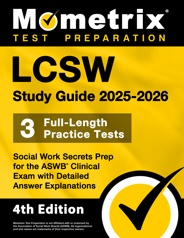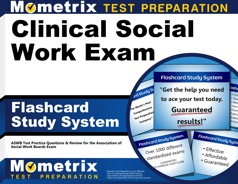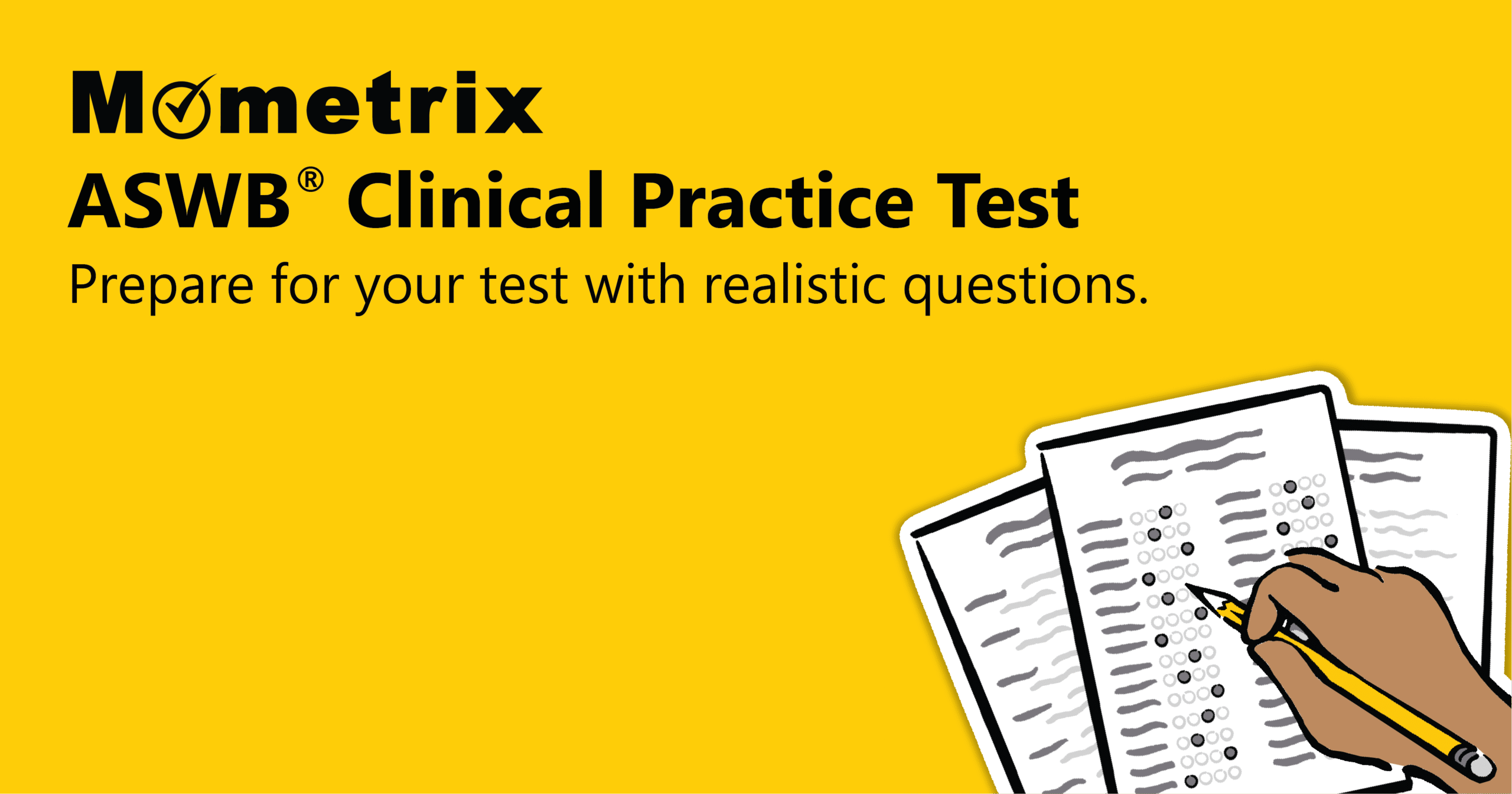If you want to be a clinical social worker, you need to get licensed. The Association of Social Work Boards® (ASWB®) administers the Clinical Social Work licensing exam. Professionals who pass the exam show they have the knowledge and skills to succeed in the field.
What’s the test like? How can I get a study guide that will help me pass?
The information on this page will help! Click the “Start Test” button above to take a free ASWB Clinical exam practice test.
About the ASWB Clinical Social Work Test
The ASWB Clinical Exam includes 170 questions spanning four core aspects of a career in social work. Those four aspects include:
I. Human Development, Diversity, and Behavior
Human Growth and Development: This topic includes the impact of body image; various developmental theories, including sexual development and spiritual development through the lifespan; the impact of loss, separation and grief; gerontology; and the effect of aging parents on adult children.
Human Behavior in the Social Environment: This topic includes details about interpersonal relationship dynamics, theories of crisis intervention, social change and community development theories, conflict theory, and criminal justice systems.
Diversity and Discrimination: This topic contains concepts of sexual orientation; how the transgender and transitioning process impacts behaviors, attitudes, identity, and relationships; and feminist theory.
Check Out Mometrix's LCSW Clinical Study Guide
Get practice questions, video tutorials, and detailed study lessons
Get Your Study Guide
II. Assessment, Diagnosis, and Treatment Planning
Treatment Planning: This topic covers trauma-informed care theories, objective and subjective data principles and features, and research design and methods (both basic and applied).
III. Psychotherapy, Clinical Intervention, and Case Management
Service Delivery and Management of Cases: This topic covers case management components, service delivery methods, and how the political environment impacts policy-making.
Consultation and Interdisciplinary Collaboration: This topic covers techniques in leadership and management, supervision and consultation models, and networking methods.
IV. Professional Values and Ethics
Professional Values and Ethical Issues: This topic covers social work legal and ethical issues, identifying and resolving ethical issues, and several legal and ethical issues, including dual relationships, termination, and death and dying.
Confidentiality: This topic covers using client records, information security, and mandatory reporting.
Professional Development and Use of Self: This topic covers staying objective, maintaining a safe work environment, and mastering self-care techniques for social workers.
Check Out Mometrix's Clinical Social Work Flashcards
Get complex subjects broken down into easily understandable concepts
Get Your Flashcards
LCSW Online Prep Course
If you want to be fully prepared, Mometrix offers an online LCSW prep course designed to give you everything you need to succeed!
Here’s what you’ll find in the LCSW course:
Everyone learns differently, so we’ve tailored the LCSW online prep course to ensure every learner has what they need to prepare for the LCSW exam.
Click below to check it out!

ASWB Clinical Pass Rate Analysis (2022)
The Association of Social Work Boards published an analysis of the pass rate for the Clinical exam in 2022. The board analyzed testing and scoring information from 2011-2021, including statistics related to gender, race, age, and primary language.
In a nutshell, the analysis revealed that 88% of everyone who took the ASWB Clinical exam between 2011 and 2021 eventually passed the exam. The age group with the highest pass rate is 18- to 29-year-olds, at a rate of 91%. According to ASWB’s data, more women have passed the exam than men, more people passed whose primary language is English, and the demographic group with the highest pass rate is whites.
Here are the details of the analysis.
Age
The breakdown of age categories and their pass rates (2018-2021) according to the ASWB is as follows:
- 18-29: 91% pass rate
- 30-39: 86% pass rate
- 40-49: 76% pass rate
- 50+: 65% pass rate
Race
The breakdown of race categories and their pass rates (2018-2021) according to the ASWB is as follows:
- White: 91% pass rate
- Multiracial: 87% pass rate
- Asian: 80% pass rate
- Hispanic/Latino: 77% pass rate
- Native American/Indigenous peoples: 74% pass rate
- Black: 57% pass rate
Gender
The breakdown of gender categories and their pass rates (2018-2021) according to the ASWB is as follows:
- Female: 83% pass rate
- Male: 80% pass rate
Primary Language
Test-takers whose primary language is English have a pass rate of 83%, while test-takers whose primary language is not English have a pass rate of 70%.
Historically Marginalized Groups
The data from 2011-2021 reveals that members of historically marginalized groups taking the ASWB Clinical exam increased by 14%.
ASWB Clinical Study Guide
This is one of the more important tests you’ll take in your career. Now, you need a professional study guide to help you pass. Mometrix has the ASWB Clinical Study Guide for you, one that’s been developed by professionals who understand the Clinical Social Work exam. We also have a ASWB Clinical Flashcards study system that will help you study on the go and get help from colleagues wherever you are. Then, finally, we also offer an Online Course that combines our study guide, flashcards, and other study tools into one package! All three are an excellent investment as you study for the Clinical Social Work Licensing Exam.
FAQs
Q
How many questions are on the ASWB Clinical exam?
A
There are 170 multiple-choice questions. Of those, 150 are scored and 20 are not scored.
Q
How much does it cost to take the test?
A
It costs $260 to take the test. You can request an application through your local social work regulatory board. (Note that you may have to pay additional fees to your state or jurisdiction’s licensing board.) Your board will provide the approval to take the test, and you can then register with the ASWB.
Q
What’s the time limit when taking the exam?
A
There is a four-hour time limit.
Q
When should I arrive at the test center and what should I bring?
A
You should arrive at the test center at least 30 minutes prior to the exam. You’ll need identification — a government issued ID such as a passport or driver’s license, and a secondary ID (work ID, social security card, for example) that has your name and signature.
Q
What can’t I bring into the testing room?
A
You can’t take any personal items, such as electronic devices, cell phones, watches, and outwear, into the testing room. Any personal items must be stored in a locker at the test center, and you can’t access them during the test. Food and drink are also not allowed, unless candidates have received permission in advance.
Q
What if I need to take a break?
A
You can take a short break, but the break counts against your exam time.
ASWB and Association of Social Work Boards are registered trademarks of the Association of Social Work Boards. Mometrix Test Preparation is not affiliated with or endorsed by the Association of Social Work Boards (ASWB).





